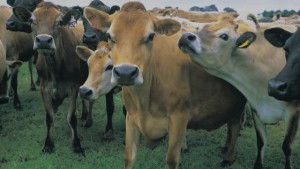If you knew nothing of the Nonhuman Rights Project, and took for granted the depiction of our organization offered by the individuals and institutions whose practices are most imperiled by it, what would you see?
Not for the first time, a proponent of factory farming is trying to raise the alarm about the NhRP’s mission and work.
In an article published on PORK Network and DROVERS: Driving the Beef Market, food-industry journalist Dan Murphy urges his readers to take seriously “the quest undertaken by [NhRP President] Steven Wise” even if at first glance it might seem “quixotic” and “crazy.”
Let it be no secret that we fully welcome commentaries like Murphy’s.
 As many NhRP supporters know firsthand, animal advocacy can be difficult, dispiriting work. Though milestones are reached and victories achieved, at every turn you’re reminded of the systemic obstacles you’re up against. Not least of these is the commonly held worldview—exemplified by factory farming—that nonhuman animals are ours to exploit. The NhRP exists to challenge this worldview and to do what we can to ensure that the law doesn’t deny animals their rights simply because of their species.
As many NhRP supporters know firsthand, animal advocacy can be difficult, dispiriting work. Though milestones are reached and victories achieved, at every turn you’re reminded of the systemic obstacles you’re up against. Not least of these is the commonly held worldview—exemplified by factory farming—that nonhuman animals are ours to exploit. The NhRP exists to challenge this worldview and to do what we can to ensure that the law doesn’t deny animals their rights simply because of their species.
No court has ever freed a nonhuman animal from captivity out of respect for his or her rights rather than concern for his or her welfare, so Murphy is right to call attention to our ambition.
Precisely because we are ambitious in ways that should give pause to animal-exploiting industries, it’s a form of comic relief for us to see where, rhetorically speaking, our opponents actually wind up once they start taking us seriously, i.e. not in the most logical or persuasive place. For example, sometimes they suggest we’re coming to take everyone’s pets (we are not). Sometimes, it’s that Steve’s friendly demeanor masks the NhRP’s insidious intent and our mission is one big plot to force everyone to become vegan (we think veganism is a great thing, but we aren’t a vegan advocacy organization).
Most laughably, as Murphy suggests in his article, we’re all in it for the money: “Think those eager young law students to whom Wise does most of his preaching aren’t also aware of the unspoken dynamic at work here, should animal personhood become a reality? I think I can summarize their thoughts in two words: Billable hours.”
Trust us: if you’re in the business of exploiting animals, you’re the one in it for the money.
Murphy’s article gets a lot wrong. Unsurprisingly, it fails to acknowledge that people are animals (“By definition, animals are not people”) and erroneously asserts that legal personhood is about standing (to name only a few points of confusion, some of which could be remedied by spending a little more time on our website; some of which, only by changing one’s worldview). The article moves quickly to misrepresentation and hyperbole with the probable desired effect of agitating his implied audience.
But here’s what it gets right:
“Some 30 years after Wise launched his movement, many people are now taking him and his legal enterprise seriously.
And so should you.”
Well, we second that suggestion.
When the people who benefit most from animals’ legal thinghood give voice to their opposition to nonhuman rights, their self-serving arguments reveal all manner of fallacious rhetoric with a healthy dose of delusion and hypocrisy. This is helpful to the nonhuman rights cause.
Whether we’re talking about proponents of factory farming, SeaWorld spokespeople, Tommy’s “owner,” Hercules’ and Leo’s chief jailer, or the Office of the Attorney General of New York, the absurd claims belong solely to those who perpetuate and attempt to defend the exploitation of nonhuman animals. Their caricatures of nonhuman rights advocates say more about their untenable, insecure ethical position than they do our mission and work. In five years, ten years, 50 years, whose arguments will be left standing?
Murphy’s central premise—that the factory farming industry should pay close attention to what the NhRP is doing—is exactly right. In this sense especially, his article represents yet another sign of progress for the nonhuman rights movement. All animal-exploiting individuals and institutions should indeed be put on notice because one day, we just might see you in court.